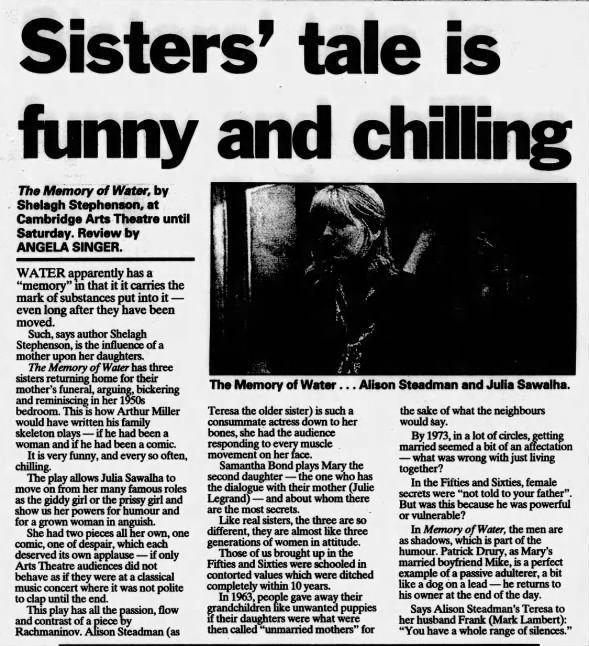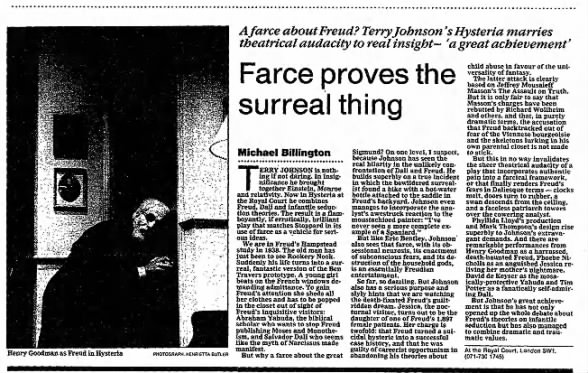I had been looking forward to this one since we booked it. I am a big fan of the late Ken Campbell, an interest going back to the 1990s. I/we saw several of his shows. Soon after he died, in 2008, we went to see a tribute to him at the Royal Court. Etc.
This piece sounded interesting, written and performed by Terry Johnson, who worked with Ken Campbell when he (Terry) was very young. Terry’s material tends to be much more structured than Ken Campbell’s stuff, but there’s usually a suggestion of that Campbellian anarchy in Terry Johnson’s writing. In short, the piece promised to be a bit different. It was.
From the moment you walked in to the theatre downstairs, now littered with comfy sofas, armchairs, suspended egg chairs and the like, you knew it was different.
“Come and sit at the front – there’s no audience participation,” entreated the ushers. Up to a point, they were telling the truth. But beyond that point things could take a strange turn.
Actually it had been a slightly strange afternoon for me. The 400th anniversary of Shakespeare’s death, I felt motivated by some incoming correspondence to put something up on Facebook about “me and the Bard”, which got quite a few friends going. If physiognomy were all it is cracked up to be, I’d have quite a few hit plays in the west end right now. But enough about me.
Ken is a short piece of some 80 minutes without an interval. The main part of the piece is about Terry Johnson’s youthful involvement in Ken Campbell’s bold The Warp project in 1979; in particular the infamous “squat transfer” to Edinburgh for the festival that year. More than half the piece is about that. The remainder picks up on Terry Johnson’s subsequent involvement with Ken. The ill-fated stage version of Hitchhiker’s Guide at the Rainbow Theatre in 1980, plus a few later overlappings.
Jeremy Stockwell does a magnificent turn as Ken Campbell (and a few other seriously good impersonations too; Stockwell’s Trevor Nunn body language is great). Terry Johnson does a reasonably good turn as himself; but I suspect that Jeremy Stockwell might have been able to do Terry Johnson better than Terry Johnson. Jeremy Stockwell in particular moves among the audience a lot, making unnerving eye contact at times.
Some of the crazy stories we’ve heard several times before, although I never tire of the “Royal Dickens Company” practical joke on Trevor Nunn, for example. Actually, it was the crazy material about The Warp that held the most interest for me; partly because that project was clearly such an anarchic, enormous overstretch, partly because I hadn’t heard the detail about that crazy production before.
Daisy didn’t enjoy the show as much as I did, but she did enjoy the show. You can sense that Terry Johnson feels that his time and relationship with Ken Campbell was hugely formative for him, so deep affection as well as the desire to tell the crazy stories pervades the script and the production.
At the end of the show, Jeremy Stockwell, still in character as Ken, together with a slightly timid young woman in a diaphanous wrap which left precious little to the imagination, invite the audience to join them backstage in a re-enactment of the nude body painting scene from The Warp.
“If you are curious, you come through this door, to my left, take off all your clothes and join in the body painting scene. If you want to go straight home, you go out the way you came through the door to my right,” said Ken/Jeremy.
“You may keep your undies on if you wish,” added the diaphanous young woman, almost apologetically.
I shall now draw a veil over the proceedings; a far more opaque veil than that of the diaphanous young lady’s wrap. So it is up to your imagination, dear reader, to wonder what Daisy and I chose to do in these circumstances. The curious door to the left, or the safety of the exit door to the right?
To borrow from that ghastly Las Vegas adage: what happens in The Hampstead, stays in The Hampstead.






